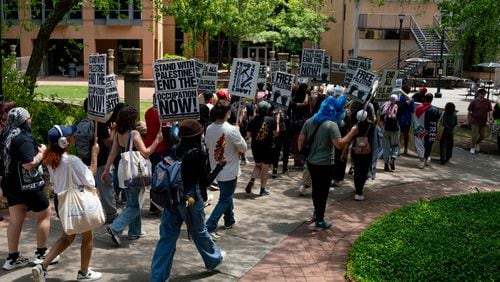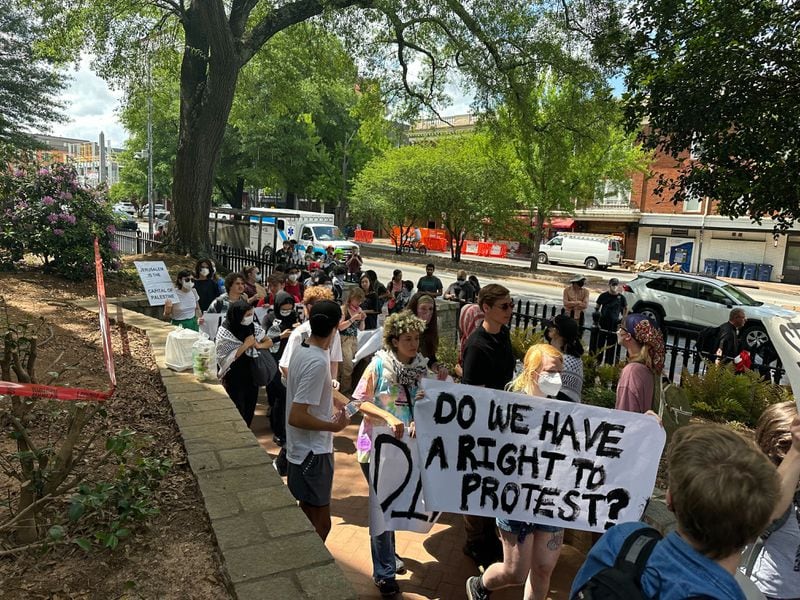The college Class of 2024 has had a tough run.
As high school seniors, they saw spring proms and graduation ceremonies disrupted by a global pandemic.
The summer before they began they began college — a time when some newly minted adults travel and live it up before venturing into another long stretch of academic drudgery — was marked by xenophobia and racial unrest across the country.
When they got to college, most of them didn’t experience a traditional introduction to campus life because of COVID restrictions. They spent their days in front of computer screens, taking classes either partly or fully online.
For some of them, the release of coronavirus vaccines during their freshman year only fueled contentious debates already raging on campus about COVID mandates.
Then, just after the holiday break, these students watched fellow Americans storm the U.S. Capitol and destroy property during a riot that resulted in five deaths and hundreds of injuries.
Throughout their college careers, they’ve found themselves pawns in a fractured society as Americans debate student debt forgiveness, academic freedom, abortion rights, voting restrictions and climate change.
And now, in the final days of their undergraduate studies, they see protests erupting on more than 100 campuses nationwide as students join the fray over the ongoing Israel-Hamas war in Gaza.
Some colleges are canceling classes. Police are arresting protesters. School administrations are suspending students. Events are being scrapped.
It seems the Class of 2024 just can’t catch a break.
Gen Z (aka Zoomers) are often stereotyped as being apathetic, disconnected and fragile. But, when I look at what the Class of 2024 has been through, I see the building blocks of fortitude. Adaptability. Resilience. Those are character traits this country likely will need to get through tough years ahead.
This is a generation that is more complex than many adults are ready to accept or understand. This cohort has bore witness to more trauma in young adulthood than many of us do by that age.
And yet, in so many of these students, there’s enough optimism to believe they can change the world.
They also harbor enough pessimism to believe the world needs changing. An abundance of surveys have pointed to the high levels of disillusionment among young adults. About one-third of 18-34 year olds say they experience high levels of stress, according to the American Psychology Association, making Gen Z (born between 1995-2010) the most stressed-out generation.
A recent Wall Street Journal poll found more than three-quarters of voters under age 30 think the country is moving in the wrong direction. They have lost confidence in the Supreme Court, Congress, the executive branch and, as much as this hurts, the press. As the country debates whether we are in the end days of democracy, they are understandably stressed about their futures. They are seeking stability in the world.
Every young person experiences a level of uncertainty on the road to full-fledged adulting, but let’s be fair: This crew has had it tougher than so many others.
With the recent protests, some of them are doing what they can to take matters into their own hands.
That has led some adults to describe the newest crop of Gen Z college students as lawless and misguided.
For days, I watched students at my alma mater, Columbia University, wade into the complexities of the Israel-Hamas conflict. The tented encampments erected on the green two weeks ago fueled demonstrations from coast to coast.
Credit: Fletcher Page/AJC
Credit: Fletcher Page/AJC
In this state, students at the University of Georgia have been arrested and possibly suspended.
At Emory University, anti-war student factions staged a Wednesday walkout while counter-protesters prepped for an evening rally on campus. About two dozen arrests have been made.
The protests spread to Kennesaw State, the Savannah College of Art and Design, and Mercer University in Macon.
None of this is new, of course. We are a nation built on protest.
There have been plenty of voices calling for an end to the campus disruptions. There are legitimate concerns about the protests infringing on the rights of other students. It is possible that students who missed out on proms and graduation ceremonies in high school might also miss out on events again if demonstrations on campuses keep going and student safety is threatened.
Violent protest should never be tolerated (though this, too, has roots in recent American history). But it’s worth remembering that the point of peaceful protest is to disrupt everyday life so that people stop being comfortable and start paying attention.
The Class of 2024 has lived in a consistent state of disruption. We know from previous generations that the mettle forged in our formative years tends to stick around.
Earlier than most, this graduating class has had to learn that the celebrations marking the beginning or ending of life’s major events aren’t always the parts that matters most.
It is everything that happens in between.
Read more on the Real Life blog (www.ajc.com/opinion/real-life-blog/) and find Nedra on Facebook (www.facebook.com/AJCRealLifeColumn) and Twitter (@nrhoneajc) or email her at nedra.rhone@ajc.com.
About the Author








